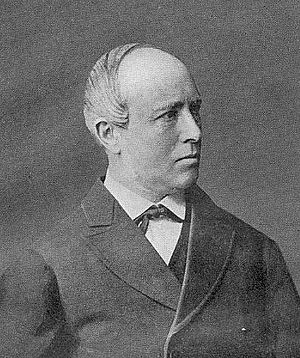Georg Curtius facts for kids
Quick facts for kids
Georg Curtius
|
|
|---|---|
 |
|
| Born | April 16, 1820 |
| Died | August 12, 1885 (aged 65) Hermsdorf am Kynast, Kingdom of Prussia, German Empire
|
| Nationality | German |
Georg Curtius (born April 16, 1820 – died August 12, 1885) was an important German scholar. He studied languages and how they change over time. This field is called philology. He was also known as a "comparativist" because he compared different languages to understand their history.
Contents
Early Life and Education
Georg Curtius was born in Lübeck, a city in what was then the Kingdom of Prussia. He had a brother named Ernst Curtius, who became a famous historian and archeologist.
Georg went to universities in Bonn and Berlin to get his education. After finishing his studies, he worked as a schoolteacher in Dresden for three years.
A Career in Academia
In 1845, Georg Curtius returned to Berlin University. He became a privatdocent, which was like a private lecturer. This meant he could teach at the university.
In 1849, he was put in charge of the Philological Seminary in Prague. A seminary is a place where students study a specific subject in depth. Two years later, he became a full professor of classical philology at Prague University. Classical philology is the study of ancient Greek and Latin languages and literature.
Moving to New Universities
Curtius moved to different universities during his career. In 1854, he left Prague to take a similar professor job at Kiel University. Then, in 1862, he moved again from Kiel to Leipzig University.
At Leipzig, he taught about Indo-European languages. These are a large family of languages spoken across Europe and parts of Asia. He also taught about the history of grammar in classical languages.
Important Contributions
Georg Curtius worked hard to connect the study of classical languages with the study of how languages change over time. He wanted to "bridge the gulf" between these two areas. This means he helped scholars see how understanding ancient languages could help them understand modern ones, and vice versa.
His ideas about languages had a big impact on other scholars. Many of his students followed his approach in their own work.
Key Books and Works
Curtius wrote several important books that influenced the study of languages. Some of his most well-known publications include:
- Die Sprachvergleichung in ihrem Verhältniss zur classischen Philologie (1845): This book was about how comparing languages relates to classical philology.
- Sprachvergleichende Beiträge zur griechischen und lateinischen Grammatik (1846): This work focused on comparing Greek and Latin grammar.
- Grundzüge der griechischen Etymologie (1858–1862): This book was about the origins of Greek words.
- Das Verbum der griechischen Sprache (1873): This work focused on verbs in the Greek language.
The last two books were so important that they were translated into English.
From 1878 until he died, Curtius was the main editor of a scholarly journal called Leipziger Studien zur classischen Philologie. His book Griechische Schulgrammatik, first published in 1852, was very popular. It went through more than twenty editions and was also published in English.
Later Years and Legacy
In his last book, Zur Kritik der neuesten Sprachforschung (1885), Curtius disagreed with the ideas of a new group of scholars. This group was called the Neogrammarian school of philology.
Georg Curtius passed away in Hermsdorf am Kynast when he was 65 years old. One of his students, Karl Brugmann, took over his position at Leipzig University. After Curtius died, his collected shorter writings were published by Ernst Windisch. In 1886, he was chosen to be a member of the American Philosophical Society, which is a great honor.
See also

- In Spanish: Georg Curtius para niños

